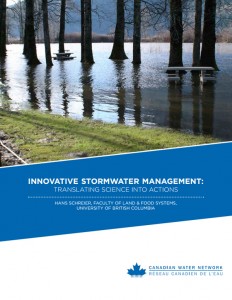Innovative Stormwater Management
Principal Investigator - Hans Schreier, Professor, University of British Columbia

Challenge
Changes in urban land use and an increase in extreme weather events have affected urban stormwater management. These changes are due to alterations in the hydrological cycle and stream flow dynamics, as well as an increase in transportation of contaminants to water courses. To increase understanding of innovative approaches to stormwater management in an urban context, a group of experts led by Dr. Hans Schreier sought to increase understanding of innovative solutions, communicate research on these solutions to development communities, highlight what gaps exist in the research area, and share information on what innovations are effective across Canada.
This project examined a wide range of innovative approaches to stormwater management in Canada in order to provide planners, developer and municipal engineers with information on stormwater management through a series of workshops.
Project
Over the course of this project, the research team conducted a comprehensive literature review on innovative approaches to stormwater management. They focused on a variety of effective stormwater management practices, including:
- Property level: roofwater harvesting, rain-gardens, green roofs, infiltration systems, soil management, rainfall interception by trees, minimizing impervious surfaces, and reusing and recycling water
- Neighborhood level: reducing road width, removing curbs and gutters, directing road runoff into infiltration swales, creating stormwater detention systems and wetlands, and developing pervious pavements
- Watershed scale: wide buffer zones, creation of wetlands (and their effectiveness in trapping and reducing pollutant transport), designating and enforcing flood zones, and avoiding the channelization of streams
The project also assessed the utility of an online water balance model, developed in British Columbia, to reduce storm water generation, and concluded that the model must address further issues before it can be effectively applied across Canada.
These results were communicated to developers, practitioners and municipal engineers over the course of four workshops across Canada (Vancouver, Calgary, Edmonton, Toronto). At each of these workshops, participants were also exposed to a local case study of innovative water management.
Outputs
- Four major conferences were held in Vancouver, Calgary, Edmonton and Toronto, where over 650 developers, practitioners and municipal engineers had the opportunity to learn about innovative approaches and research centering on stormwater management at the property level, the neighbourhood level and the watershed level. These two-day conferences consisted of one day of presentations and one day in the field, learning about innovative stormwater management approaches in the city.
- Presentations were hosted online to make them available to end users who could not attend the conferences.
- Case studies of the innovative approaches showcased at the conference are featured in a special issue of the Water Quality Research Journal of Canada (April 2009 issue).
Outcomes
- The workshops helped to inform over 650 developers, practitioners and municipal engineers about innovative approaches to stormwater management; there were a number of additional requests to access this information from practitioners who were unable to attend the workshops.
- Assessment of an online water balance model also helped with model development by revealing a number of important issues associated with infiltration and groundwater that must be addressed before the model can be put into practice.
- This project will help determine the best options for constructed wetland systems. Existing storm water detention ponds and constructed wetland systems will be identified and their effectiveness in trapping and reducing pollutant transport will be examined. This will help aid in pathogen reduction, mosquito problems and safety issues.
- This project has helped train two graduate students, creating highly qualified personnel in the field.



